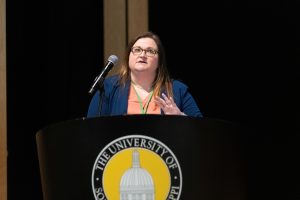Reinemann Honored with Early Career Award from Mississippi Academy of Sciences
Story by Kayla VonBurg-King
Dr. Nikki Reinemann, Assistant Professor of Biomedical Engineering has been honored with the Early Career Award by the Mississippi Academy of Sciences (MAS), recognizing her exemplary contributions in research, teaching, and service.

The MAS helps to foster the exchange of scientific ideas in the state of Mississippi through education, community assistance, and the promotion of scientific knowledge. This award, celebrating excellence among pre-tenured faculty, underscores Reinemann’s commitment to advancing biomedical engineering while also nurturing the next generation of scientists and engineers. Dr. Babu Patlolla, President of MAS, in recognizing Reinemann’s achievements, remarked:
“Dr. Reinemann’s commitment to engaging a host of students in STEM fields from high school to graduate programs and building a cutting-edge research program based on the ever-changing needs of Biomedical Engineering made her a top young professional in the state. In addition, her outstanding service contributions to the University and the Mississippi Academy of Sciences and her significant scholarship valued by the scientific community earned the Early Career Award from the state academy.”
For Reinemann, this accolade is deeply meaningful, affirming her efforts to excel in science while actively involving her students in research. “I try my best to be a good teacher and do good science but also bring students along the way” she states, emphasizing the collaborative spirit of her work. “This award reflects the success of my students as much as my own.”

Driven by a lifelong passion for research and mentorship, Reinemann’s path to biomedical engineering was shaped by her undergraduate experiences and a timely job opportunity as she completed her studies. “Right as I was about to graduate, this job opened at the University of Mississippi,” she states. “It was an opportunity I couldn’t miss.”
Reinemann’s advice to early career researchers centers on the significance of a student-focused approach and the necessity of overcoming imposter syndrome. She advocates for a balanced view of success in academia, encouraging aspiring engineers to pursue their careers confidently while maintaining a healthy work-life balance. “Imposter syndrome is real, but you’re more than capable of being in the same space as others,” she states. “Many young people think you must work 24/7 to be successful, but really, you just have to be purposeful in the way you integrate your work in your life.”
Looking forward, Reinemann seeks to understand the “rules of life” at a molecular level. Her research delves into the design principles of the cytoskeleton of a cell, specifically examining how motor proteins, crosslinkers, and filaments interact to drive the essential functions of life. Her vision extends to making significant impacts in biomedical engineering through understanding cellular mechanisms and advancing the field.
Reflecting on her journey and achievements, Reinemann takes the most pride in her resilience and success. “I was a single mom in grad school, and a lot of people said I couldn’t do it,” she said. “By not only getting through grad school but also doing it successfully, I use that experience as a guide in how I mentor students now.” Her story is not just one of scientific achievement but also of personal growth and the power of mentorship in shaping future leaders in engineering and academia.